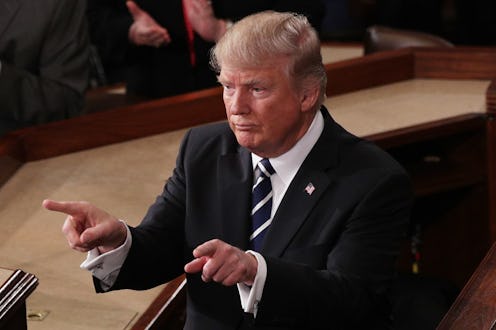News
Don't Let Trump's Tax Release Be A Diversion

It didn't take too long after Rachel Maddow's much-hyped broadcast started Tuesday night for the fickle audience of Twitter to start calling the story on the leaked tax returns from President Donald Trump a "shiny object" — that is, it's something exciting but unimportant, meant to distract seagull-like news consumers from some other big thing that really deserved their attention.
But before this story gets ruled as "a nothingburger" or "a diversion" — let's look at what we know now, per Vox:
- Donald and Melania Trump made about $150 million in 2005 and paid around $38 million in federal taxes.
- They wrote off $103 million in business losses.
- They paid $31 million in the alternative minimum tax and paid only $5.3 million in income tax.
It's not the sexy, presidency-ending story that some people on Twitter might've been hoping for, however, that certainly doesn't make this first bit of information about Trump's taxes irrelevant. In fact, voters are extremely interested in hearing more about his tax returns, despite Trump's multiple claims that only the press cares about this unprecedented gaping hole in executive transparency.
This is sort of a trend in Trump era news cycles — a story breaks, the internet loses it, another corner of the internet argues that the story is only meant to distract from some other more pressing matter and then, pretty soon, another story breaks. Repeat.
If the news that breaks isn't the Big Thing (frequently called a "silver bullet," but that's quickly becoming cliched and frustrating), it's dismissed immediately — particularly if it's about something dry and bureaucratic like tax code.
What bears repeating is the fact that people can care about and understand multiple stories at the same time and recognize their importance. In other words, this story can only be a diversion or a distraction if you allow it to divert you. Further, the idea that these tax returns can be a diversion (existing in a vacuum apart from all other Trump scandal) creates a world where only one thread can be acknowledged and investigated at any given time — which is hardly a way to weave a complete, thorough narrative. The key isn't to argue that a new piece of information is somehow a diversion from the larger story, but to encourage readers to add it to that larger context — an assist rather than a slam-dunk.
And, in this case, the larger context is one in which we see a president (prone to self-leaks) with some Scrooge McDuck amounts of money who demonstrates a considerable amount of contempt for the first amendment and a personal stake in abolishing a part of the tax code that kept him from exploiting loopholes in the past. While we aren't seeing the connections to other larger concerns (regarding Russia, Trump's business ties, and more), it certainly doesn't mean that we shouldn't keep asking questions — and use any and all new information to demand accountability, transparency, and (please, please, please) deeper investigation.